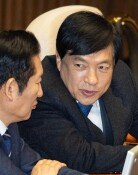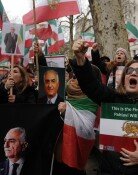[Editorial] Is It That Hard for the President to Change His Flawed Way of Governing?
[Editorial] Is It That Hard for the President to Change His Flawed Way of Governing?
Posted July. 07, 2005 02:29,
In his message posted yesterday on the Cheong Wa Dae website, President Roh Moo-hyun stressed the important role of politics, saying, A strong economy needs good governance. He brought up the significance of politics with the intent to support the necessity of a coalition government, which was presented by the president himself in order to deal with the big opposition party. Now the opposition occupies more parliamentary seats than the governing party. Meanwhile, the president left to Prime Minister Lee Hae-chan the job of presiding over meetings on the publics economic welfare. When some papers commented on the matter, saying, It might be the very first sign of the president focusing primarily on political affairs, the president countered, saying, If one loses his control, he might turn nasty.
As we observe that the presidents remarks on a coalition government further complicate things, we realize the need to know what happened in Korean politics during the period leading up to the present situation. Since late last year, President Roh repeatedly expressed his resolve to concentrate on the economy. And the Korean people were hopeful. The people hoped that the president, as the CEO of Korea Inc. would follow a politically pragmatic path to re-ignite the growth engine of the country. What they did not want was a chieftain of some political faction that represents a single interest group or ideology. This is in line with the core of the message conveyed through the April 30 by- elections, which resulted in the bigger opposition and smaller governing party situation. At that time, Koreans wanted the president to handle issues with new personnel since those issues were hard to solve with the existing policy frame and pool of talent.
Yet President Rohs management of state affairs ran counter to the peoples expectations. When told that he had to change the way he handled national affairs, the president responded by promoting members of his inner circle to key posts. The only possible interpretation of the personnel decisions is Whatever they say, I do it the way I want to do it, which is an expression of ludicrous arrogance. When some pointed to policy failures, he doggedly attacked them with all sorts of words.
After the shooting incident at a frontline post, the opposition submitted the proposal of dismissing Defense Minister Yoon Kwang-ung, saying "he is liable to the accident. But the president reacted by saying that the ruling party has limited power due to its minor status in the National Assembly. In fact, after winning the general election last year, the only thing the Uri Party managed to do with its superior position was to confront the opposition party over the four major bills on the National Security Law, the probe into historical issues, the media, and the private school, further deepening the ideological rift. That is why some criticize the presidents remarks in favor of a political coalition. They say, It is the presidents mismanagement of state affairs, not the institution that is to blame.
Economic indexes for the first half of 2005 belie the presidents strong will to concentrate on the economy. The economic growth estimate for this year was adjusted downward back to about three percent, falling short of the growth potential for three years in a row. The government cited a decrease in tobacco production as the cause of slow growth in the first quarter, 2.7 percent. Now it points to the jump in oil prices. Then how can the government explain China and Indias expected economic success this year (9.5 and eight percent, respectively) when both nations face the same headaches? In Korea, corporate investment is only 70 percent of the level it was at prior to the Asian financial crisis. Due to sluggish domestic spending, the country relies on exports for more than 80 percent of its economic growth. With economic polarization worsening, concerns linger that Korea could slip into just the same long-lasting recession as Japan experienced. And yet, the prime minister angered the public by saying, Economic conditions are now better for the general public.
On the real estate policies, President Roh said, I will be personally engaged in the real estate policies. Still, his policies failed to keep up with the trends in the market and did not work. A discussion was held on real estate policies among the ruling party, the government and Cheong Wa Dae on June 17. At that meeting, the government had to admit that over 20 policies proposed for about two years failed altogether. Recently, the government and Cheong Wa Dae are being irresponsible by claiming, Land prices went up only for some parts in Gangnam. Some could be excused if they said that the Participatory Government is showing incompetence in coming up with an agenda.
Today President Roh invited editors and news operation chiefs to Cheong Wa Dae to map out a new blueprint of conducting state affairs. The first consideration of good governance is to regain the trust of the people and market. Politics that benefit the economy, as emphasized by the president are impossible if the president does not restore trust in his words and the new blueprint. The president could overreact to the criticism against a coalition government and the focus placed upon letting the public debate over a constitutional amendment. It will be better if he chooses to calmly reflect on why they are doubtful of his words and why they say, The president attempts to gloss over economic failings. The Korean people still want the Participatory Governments efforts to be successful.



![“잠만 자면 입이 바싹바싹”…잠들기 전에 이것 체크해야 [알쓸톡]](https://dimg.donga.com/c/138/175/90/1/wps/NEWS/IMAGE/2026/02/23/133404749.3.jpg)



